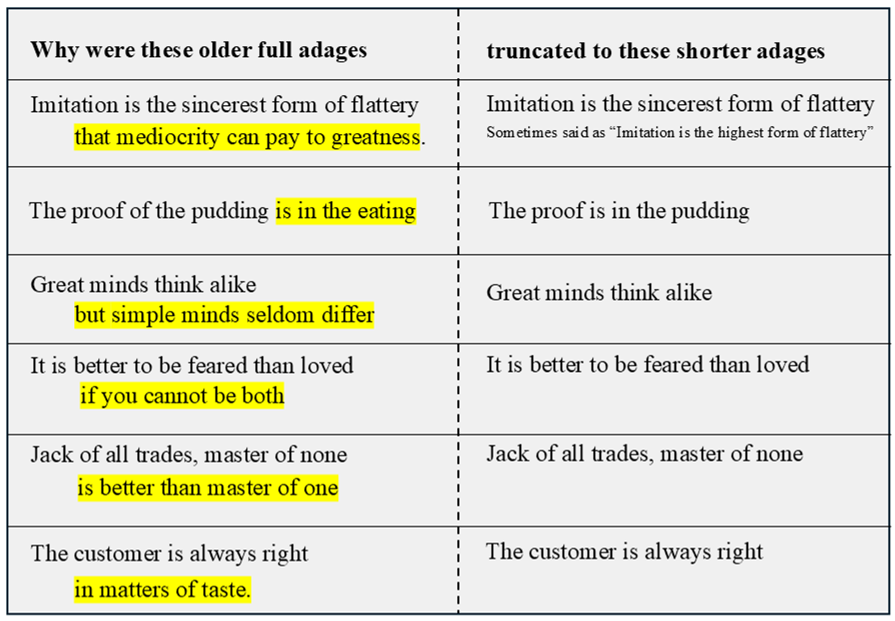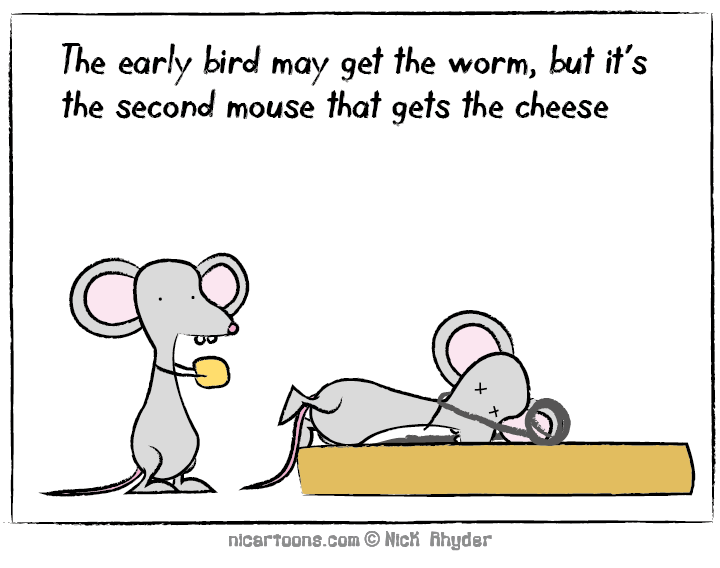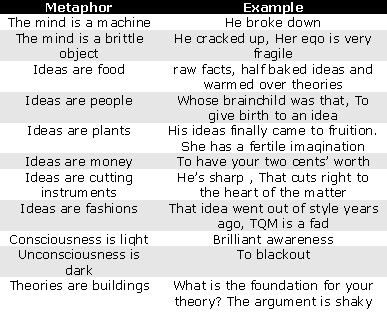Home / Philosophy / Words, words, words
The Power of Words
Words build civilizations
- Without the ability to store and retrieve knowledge in media (stone, wax tablets, papyrus, paper, digital spaces), civilization can too easily and catastrophically be reset to a blank slate.
- For Early Peoples (pre-writing technology societies) each person had to carry in their memory a wealth of knowledge, specifically for each person, their own expertise.
- If a shaman (healer) in an Early People's tribe dies, the tribe not only loses a healer but also loses all of that knowledge, and unless others can remember anything about that knowledge, the shaman's knowledge must be recreated from scratch
- Catastrophies in Earl Peoples societies meant having to "reinvent many different wheels," over and over and over due to death in wars, plagues, and environmental changes.
- To avoid catastrophic resets of a civilization, a civilization needs:
- a written language of some form
- to be able to store (inscribe that language) in a medium (stone, papyrus, wax tablet, paper)
- to have a skill to find specific knowledge in storage (such as seeking a specific scorll or book in a large library)
- to understand how to retrieve that stored knowledge (such as reading a lnagugae in a scroll or book)
- to reason or experiemnt with that retrieved knowledge with the sole intent of adding one's experiemntal findings to that knowledge
- to re-store that newly advanced knowledge into storage
- to train the next generation, so that they can store knowledge, retrieve the knowledge, add to the knowledge, and re-store the new knowledge.
Manipulating adages to embed different ideologies.
- Often cultures truncate phrases, adages, myths, and folklore to fit the weltanschuuang or zeitgeist of a time.
- The question, philosophically, is why?
- Who benefits from that truncation?
- What ideology once was uplifted with the older adage?
- After truncation, what other ideology is now being extolled?

Moving past personal pyschology or, worse, pop-pyschology:
- Joel's assertion of ego opens up a discussion concerning what wider societal ideology an individual ego caters to.
- For instance, look up the native American sundance, where people embed hooks into their chest and, through suspension or forced tension, they dance: A tree was ritually cut down and placed in the center of the circle as a pole. A "thunderbird nest" was attached near the top of the pole. On the final day, young men attached themselves to the pole with rawhide thongs pegged through the skin of their chests and danced, looking up at the thunderbird nest."
- Compare that with modern Americans body-building in a gym.
- Both are ego centric activities (not in a bad way--ego is not, ipso facto, a bad thing), but both are clearly different ways of catering to the ego.
- However the Sundance is about perseverance through a torturous trial while giving oneself over to a higher power and the other is beautification of the human body; both of these are more than just personal psychology of ego.
- Said another way, the desire of ego fulfillment in the gym may have that same personality, if transported into another culture, eschewing working-out for being strung up with hooks.
- We may start with saying ego, but ego as it relates to many people, to a normative in a culture, is culturally contextualized, and since there is a culture context, there are ideologies underpinning that culture.
- Which brings us back to Who (within What ideology) benefits?
- For example, this adage:

The old adage of the mousetrap and its possible ideology
- The old adage suggests careful caution and prudence.
- By being cautious and prudent, the first mouse will be trapped, allowing the second mouse to grab the cheese.
- That scenario could imply a selfishness in allowing another to be injured or killed for one's own gain unless the second mouse was not waiting for the first to get trapped but instead wandered onto the scene after the first mouse's death.
- The ideology of the old adage suggests values of being cautious, judicious, and prudent, a variation of the adages "think before speaking" or "look before leaping."
The truncated adage of the mousetrap and its possible ideology
- The new adage espouses FOMO, fear of missing out, and promotes an ideology that being an early adopter gives one advantages
- In the truncated adage of "Early bird gets the worm" that advantage is food.
- In this truncated version, cautiousness, judiciousness, and prudence are no longer involved or considered.
- In this version, the adage focuses on right timing and that timing is all about competition.
Who benefits?
- The old adage espouses caution.
- The new adage throws caution to the wind and promotes being first.
- Who or what institution benefits from people seeking to be first in line and how is it that that institution benefits from people NOT being cautious and prudent?
- Nearly every company, and capitalism overall, benefits from impulse buying.
- Your social media feeds and mid-video advertisments are all meant to have people act impulsively.
- One cannot be impulsive if they are the second mouse always waiting with prudence and caution, if they have a "wait and see" mindset.
Last thing
Soren Kierkegaaurd, the father of Existentialism, was commanded by his father that while young Soren was in school, Soren had to achieve the second best grades in the class.
The Magical Influence of Words
- Assignment
- Mr. Pack
- If you have not read the story yet, read it now. Everything on this page makes much more sense if you read the story first. If you do not read the story first, you will only be able to comprehend, not apprehend, the following ideas and concepts.
- Love is construction/ magic
- Metaphors We Live By
- Symptoms
Assignment: My Former-self Word Use
- Analyze a former writing = 100 points
- Find a paper you once wrote
- The older the better, but nothing earlier than high school
- Not something to formal
- Choose one of your writings where yuor words flowed freely.
- Analyze every word for metaphors
- See the Metaphor section below
- Highlight or encircle words that you deem as similiar, that is, being in the same container
- Determine container words for sets of similiar metphorical words
- Analyze each container grouping as a symptom in American culture.
Why are we doing this assignment
- While many of us hone our skills at debate or argument (for or against) various life issues, few people focus on the words being used in those debates or arguments.
- Even if we agree on the same beliefs and ideologies during a discussion, word choice and word use allow one person to stealthily bias the other person's reasoning and broader belief system.
- Being vigilant of other's word use (which carries inherently within those words far ranging and thought altering metaphors) positions a person to operate a defense against indisious metaphors during a discussion, debate, or arguement of a particular position
Mr Pack, a story about words
- Read the story Mr. Pack
- If you have not read the story yet, read it now. Everything on this page makes much more sense if you read the story first. If you do not read the story first, you will only be able to comprehend, not apprehend, the following ideas and concepts.
- We already read this story in class. Like any story, this story can enter our mind and shape what we think. However, most people engaged with any story already have a for/against critical mindset of what they agree with and what they disagree with.
- While that for/against more than likely derives from one's family, religion, political views, peer-group/ comfort circle, and wider culture, what most people are not critical of is the words being used within those stories (indeed, it takes a measure of training for one's ear and eye to be vigilant to words use).
- As a species, we are constantly vigilant of our surroundings. This vigilance heightens when we are in danger and/or when the situation is unknown, and this vigilance lessens when we are safe and/or in a known situation. This vigilance iinforms our for/against engagement, sometimes offering knee-jerk reactions, which was eminently useful for survival in the deadly world of pre-historic peoples.
Containers of Metaphors
| Love/relationships as | Construction | Magic | |
|---|---|---|---|
| We build our relationship | She bewitches me | ||
| on a foundation of trust | and I am contiually charmed by | ||
| buttressing that with honesty | her ability to hypnotize my every thought | ||
| and supporting each other | enchanting me with her humor and thoughts | ||
| through the continued development | until I am spell bound by her entirety |
- A series of metahpors, connected by a comon theme is a called a conceit
- There two conceits above: Construction and Magic.
- Each conceit carries within it a series of assumptions.
| The conceit of | Construction | Magic | |
|---|---|---|---|
| Logic and reasoning | illogical and irrational | ||
| process-oriented | spontaneous | ||
| mathematical and known | arcane and unknown | ||
| based on skill | experience based | ||
| utilitarian | whimsical |
- While we can both agree on the positive aspects of relationships, the words in the two containrs (the conceits) alter the reciever's perception of love/relationships.
- The Construction container (conceit) suggests love/relationshisp is concept that is logical, process-oriented, mathematical, and useful.
- The Magic container (conceit) suggests an irrational, arcane amd whimsical view of love/relationships.
- Using either of those containers in speech or writing, we could bias a person's view of love/relationships by implanting into their mind those subtley placed words.
- Discussing love/relationships with only the Construction container will, like how you apprehended the name of the animal in the story Mr. Pack from all of the associated words, make them start thinking of love/relationships as logical, process-oriented, etc.
- Discussing love/relationships with only the Magic container will, like how you apprehended the name of the animal in the story Mr. Pack from all of the associated words, make them start thinking of love/relationships as an irrational, arcane, etc.
Lakoff and Johnson and Metaphors We Live By
Language Codes

Videos
Writings
- "Metaphors of/for Language in Popular Culture"
- Lakoff and Johnson: Examples of Metaphorical Containers (pdf file)
- Semiotics 1
Linguistic expressions that are symptoms of ideology
- (Doctors do not look for the disease, they look for symptoms which indicate the appropriate disease.)
There are many many "diseases" causing the symptoms. Patriarchy, Religion, Capitalism, are but a few large scale ones.
The lesser ones though sneak under the radar, such as need for control, need for power over others, lack of education/reasoning, everything must have a purpose, or worth, or usefulness.
There are too many to list.
Symptom: It's not practical; it's just book smart; you need street smarts
- "disease": everything must be practical and useful.
- "Everything you are able to do should be more useful to other people than to yourself "
- Those three phrases are the rallying cries of the exploited attempting to make others exploitable.
- No. A skill. An activity. Learning. All of those do NOT need to be useful to anyone but you. If you enjoy something, if it enhances what in life YOU want enhanced (and hurts no others), you are morally free and to enjoin in that skill, or activity, or learning.
- "A tool is practical; are you a tool?"
- Nolite te bastardes carborundorum
Symptom: Back in the day
- Disease: lack of education
- "I have no idea what I am talking about, so I am just gonna say 'Back in the Day' to convince you"
- Means the person is now about to cite some alleged historical example as a means of persuading you of the legitimacy of their point; however, they don't actually know when in history (or really, if in history) such an event occurred; the event just allegedly occurred "back on some day in some past time and I don't really know when, or if, because I'm not intellectually curious enough to actually research history; all I want right now is for you to agree with me based on my 'proof'"
- When someone says "back in the day" immediately interrupt and say "Excuse me, when was that?"
respect
- Disease: need for control/power
- "I am the judge of who is the moral authority here, and it's me"
- This is a pure power play that assumes the person's authority over the subject and over you. By saying "respect," the person means that "you must kow-tow, bend down, lower yourself before me because I am more powerful than you." The utterance of the word "respect" is to say "I am now going to be the sole arbiter of what is right and wrong, moral or immoral, and thus you must be subservient to me"
- If the person does not mean "respect" in the aforementioned way; the person should be easily able to say the same statement but without using the word respect
- When someone says "respect" immediately ask for a re-phrase without the word respect.
- You need to respect this car I gave you.
- You need to properly maintain this car I gave you.
disgusting
- Disease: False sense of Moral Superiority
- "I am the judge of morals, and my morals are based on how I feel, and immoral people or acts are less than human."
- Often the term is used in "moral" arguments to suggest something that doesn't match that person's moral view. By using a visceral term such as disgusting, they are able to remove the discussion from the realm of discussion and into the realm of visceral body experience to the point of being anti-intellectual. If you think of a food that makes you immediately recoil (due to smell or sight), you'll realize that no depth of intellection will grant you acceptance of that food; at best, you'll be able to fake a stoicism. The person using the word disgusting in relation to moral views aims for you to have their same gut response.
- People who utilize this word in relation to morals often use the word in relation to anything else they dislike.